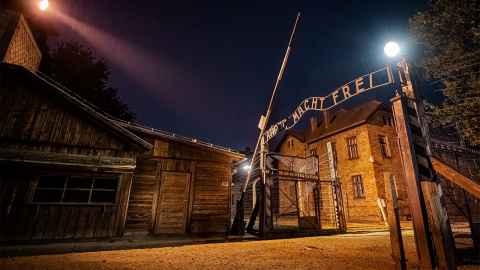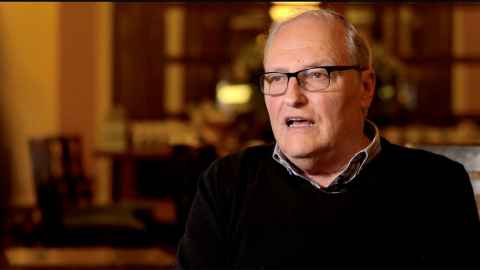NZ must step up against antisemitism
3 February 2020
Opinion: NZ must look at its patchy history with the Holocaust and ensure the rise in antisemitism around the world is given no ground here, writes Sheree Trotter.

The dust is settling after a flurry of commemorative events and articles, locally and internationally, marking the 75th anniversary of the liberation of Auschwitz. In the days leading up to UN International Holocaust Remembrance Day (January 27), the hashtag #WeRemember circulated on social media, with encouragement to contemplate that horrific period of history.
UN Holocaust Remembrance Day falls at the height of New Zealand’s summer holiday season, when sun and surf are uppermost in many Kiwi minds. So it’s hardly surprising that Holocaust commemoration commands relatively little attention. Of greater concern, however, is that according to a poll undertaken in July 2019, New Zealand appears to suffer Holocaust amnesia. The multi-choice survey revealed that only 43 percent of respondents knew that approximately six million Jews were killed in the Holocaust, 20 percent thought fewer were killed, 37 percent were unsure, and worryingly, 30 percent were unsure whether the Holocaust had been exaggerated or was a myth.
Holocaust education is not compulsory in our schools - this may contribute to the knowledge gap. However, New Zealand’s failure to send a representative to the recent World Holocaust Forum in Jerusalem suggests a problematic relationship to the Holocaust. Indeed, our history vis-à-vis the Holocaust makes for grim reading.
As Hitler’s programme of isolation, discrimination, and dispossession of Jews took hold in the 1930s, our local Jewish community undertook many desperate measures to bring family members to safety in New Zealand. Numerous statements of sympathy from the government, the churches, community groups and individuals were heard. Some groups showed great commitment to the Jewish people. The Christadelphians wrote letters and sent funds to the Jewish community. A Ngapuhi elder told me of his forbears travelling to Wellington to offer the government land for the Jewish refugees. They were told, “go back to your hovels”. The government did little to help refugees fleeing Europe.
In the period between 1933 and 1939 a paltry 1100 Jews were permitted into New Zealand - and those, under the most stringent requirements, as historian Ann Beaglehole describes in her book, A Small Price to Pay: Refugees From Hitler in New Zealand. Little consideration was given to their plight as refugees in a deadly predicament. Indeed, Auckland’s Rabbi Astor, writing to Mark Fagan, Acting Minister of Customs in 1939 on behalf of refugees seeking asylum in New Zealand, sought a waiver for one applicant who was unable to sign the form because he was in a concentration camp. The sponsoring relatives were required to declare that they would seek no further help for relatives or friends. New Zealand’s policy at that time was harsh and punitive.
Fortunately, New Zealand’s immigration policies no longer exhibit the xenophobia of yesteryear. More recent incidents, however, suggest there is still progress to be made in dealing properly with the Holocaust. Dr Efraim Zuroff of the Simon Wiesenthal Centre, also known as The Last Nazi Hunter, has spent much of his life tracking Nazi war criminals and bringing them to trial. Up to 46 Nazi war criminals are believed to have fled to New Zealand after World War II. Despite a two-year investigation by a government-formed, two-man taskforce in the early 1990s, none of the suspects was brought before a court of law.

In an interview last year, Zuroff stated that ‘New Zealand was the only Anglo-Saxon country, (out of Great Britain, United States, Canada and Australia - South Africa was not open to immigration at that time), that chose not to take legal action after a governmental inquiry into the presence of Nazis in New Zealand’.
Government policy and actions are not the only areas in which New Zealand has been found wanting. Our nation has the dubious distinction of being the only Western country in which a tertiary institution holds a thesis denying the Holocaust. In addition, New Zealand is also one of the few western-style liberal democratic nations that has not joined the International Holocaust Remembrance Alliance, which promotes education, commemoration and research.
If we are to be a nation that gives ‘nothing to racism’, we must grapple with the Holocaust, its causes and our relationship thereto.
The antisemitism that drove the genocide of the Jews was not new - it had festered for millennia. However, the efficiency and drive of the Germanic version honed the process of killing. Murder was industrialised on a grand scale. Unfortunately, antisemitism continues to fester and we are now witness to a surge in antisemitic attacks around the world, on individuals and groups.
New Zealand is not immune to this phenomenon. In the past few weeks, there have been several incidences of swastikas painted in public places. News sites that reported the recent incident outside Temple Sinai in Wellington received comments such as the following:
You would be surprised at who did it…
Check the rabbis garage for fluro paint.
These attacks always end out being zionists going after the sympathy note. Amoral scumbags.
The vile comments, frequently seen on social media, prompted Race Relations Commissioner Susan Devoy to comment in 2018 that “If Facebook were around during the Third Reich these posts would’ve fitted right in…".
Antisemitism has an uncanny ability to change its form to suit the season. One of the most prevalent forms of Jew-hatred today comes in the form of anti-Zionism. The International Holocaust Remembrance Association has formulated a definition of antisemitism explicitly connecting anti-Zionism with antisemitism. The IRHA definition states:
“Manifestations might include the targeting of the state of Israel, conceived as a Jewish collectivity’ with the proviso, ‘However, criticism of Israel similar to that levelled against any other country cannot be regarded as antisemitic.”
In addition to the alarming rise in antisemitism, we are also witnessing the re-writing of history in a number of European nations, in an attempt to create distance from the genocide that occurred on their soil. The Holocaust may have happened in distant lands but its reverberations continue in our own. If New Zealand holds to the values of justice and standing against racism, it is incumbent on us to examine our own history in relation to the Holocaust and to step up efforts to ensure that antisemitism is given no ground.
Sheree Trotter (Te Arawa) is a doctoral candidate in the School of Humanities. She is co-founder of the Holocaust and Antisemitism Foundation Aotearoa New Zealand.
This article reflects the opinion of the author and not necessarily the views of the University of Auckland.
Used with permission from Newsroom NZ must step up against antisemitism 3 February 2020.
Media queries
Alison Sims | Research Communications Editor
DDI 09 923 4953
Mob 021 249 0089
Email alison.sims@auckland.ac.nz